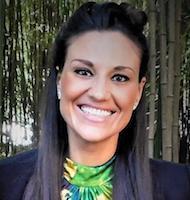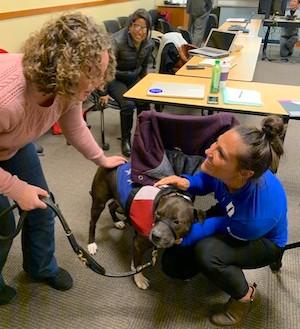
Master of Public Policy candidate James Settles is a U.S. Army intelligence officer with combat deployments to Iraq and Afghanistan over the past nine years. Last semester, he studied the veteran experience from a new angle – in his public policy course.
Settles was one of the first students to take a new course offered this past year called Public Policy and Veterans: A Social Policy Seminar—The Case of Returning Military Veterans.
“We only hear the binary narratives: veterans are heroes; veterans are broken. But really it’s a spectrum and we need to humanize the experience,” Settles said. “This course provided a range of experiences.”

Sanford faculty member Paul Dillon brings veterans issues upfront in the course, which he created this year. From his syllabus: “The plight of our military personnel, who have left the service after returning from the Iraq and Afghanistan wars, is front page news in the media every day. Often, stories of veterans suffering from post-traumatic stress, traumatic brain injury, substance abuse, debilitating physical injuries, poverty, homelessness, and unemployment lead the daily newscasts, and are the featured stories on media web sites.”
Dillon wanted to give Duke students an understanding of veterans and the issues they face. A U.S. Army Reserve veteran, Dillon served in Vietnam as a 1st Lieutenant, and was awarded two Bronze Star Medals. Representing the nation's veteran community on the Kennedy Forum on Mental Health, Dillon is a member of the Leadership Council of the Kennedy Forum Illinois.
“There are many positive skills and valuable experiences that veterans bring to our world. Our public policy students may create policies and recommendations related to veterans, and I wanted them to have first-hand knowledge of veterans – by meeting them, hearing from them and studying them,” Dillon said.
Throughout the course, students analyzed public policy responses and programs implemented to meet the needs of veterans – covering mental health, substance abuse, homelessness, housing, legal issues, employment and more.
“The first reason I took the course was that I wanted to support veterans’ issues in the academic setting. I was interested in where policy and academic thought was around these issues, given my own military experience,” Settles said.
Four students in the class were veterans, but Settles was the only one who was active duty military. He was quick to add how valuable it was to have both military and non-military students together discuss issues veterans face.
“A lot of things you see in combat you can’t describe to non-military people. It was really interesting to see how non-military people reacted to veterans issues. It was refreshing to see the issues from another perspective,” Settles said.
Before the course, Settles was working with the VA through Sanford Career Services studying veterans’ issues from an academic underpinning.
“One of the areas I’m studying is how invisible wounds manifest for a veteran. I want to understand the broader context,” he said.
“In the military, you might experience PTSD or a moral injury – witnessing something that is against your moral code. This can manifest in substance abuse, outbursts or other effects. Others might have brain injuries, which can result in loneliness and isolation from society.”
“This is the narrative that I’m fighting with: that veterans are broken toys, coming back with injuries and PTSD, and that we need to put people back together. All Veterans don’t need fixing; but rather they need to be supported to leverage their experience in civilian society. Veterans don’t need a handout; they need community, entrepreneurship and connections,” Settles said.
Chance to Serve Veterans

Hilton is an Operation Enduring Freedom (OEF) veteran of the U.S. Navy who also took the course.
“No other course offers direct opportunities to build relationships with people and organizations serving the veteran community,” Hilton said.
“My military separation and transition from active duty in Afghanistan to civilian life shaped how I viewed the course. Some veterans escape notice during their transition and aren’t connected to the people and organizations they need to adjust and thrive. I participated in this course with an expectation we would consistently address reasons why veterans struggle to transition. My hope was we would frame problems, identify causes, and discuss possible solutions—all from a policy perspective,” Hilton said.
Hilton said the course provided important discussion, questioning and problem solving – as well as connections.
“I have a passion for supporting veterans. The most meaningful aspect of the course was connecting with students, researchers affiliated with Duke, and community experts sharing mutual interests. This course brought so many people together for a common purpose. In achieving this purpose, mentors were found and friendships were developed,” Hilton said. “We didn’t have to go home with questions, or put questions on ice – Paul (Dillon) made a window for discussion.”
Prior to coming to Duke, Hilton was a vocational rehabilitation counselor interning at a Veteran Medical Center. Currently, she is a second-year master of divinity student interested in pursuing a Ph.D. in Industrial/Organizational Science. She is examining occupational health and safety issues to design better occupation-centered interventions to reduce risks of illness and disease.
“A service member may be reluctant to seek support fearing it will jeopardize their job or make them look weak. It is important to note seeking out an expert to aid in navigating a difficult situation is not an indication of weakness. However, mental health stigma in the military is still influenced by the culture i.e. ‘I need to handle this on my own.’ Seeking personal wellness is good judgement and a sign of advanced self-awareness. Ongoing chronic stress opens a person to disease and can cause serious health problems,” Hilton said.
“I came to Duke Divinity School to make new connections about healing; I was fascinated by spiritual growth because of veterans I worked with. I followed that inquiry – what separates some from healing and others from bouncing back. Often, it has to do with support structures,” Hilton said.
One of those structures are groups for veterans to gather and create community. Hilton is president of the Duke Divinity Student Veteran Partnership, an organization that brings veterans who are Duke Divinity students together for community, lunch, dinner, speakers and talks.
“As a veteran, that gives me an advantage in that I can identify with veterans. It also has a disadvantage as I am only exposed to my own experiences. Veterans of different wars have different experiences and thus different transition experiences. I was looking for a more representative narrative by learning and studying. The experts that I have met in the course have helped me to broaden my knowledge,” Hilton said.
Classroom Projects
Students worked directly with clients on veterans’ issues. Settles and Hilton worked with Military Outreach USA looking at the issues of loneliness and social isolation for veterans. The student team produced a report and pamphlet for the client, which works with faith-based organizations to create resource groups for veterans within organizations. The students focused on “face and space” to showcase ways organizations can help veterans.
“It was valuable to work with an actual client – to practice expectation management, project management, relationship management, delivery,” Settles said.
Settles and Hilton began with systematic review and used a mixed methods approach with qualitative interviews, including with the president and CEO of Military Outreach USA, retired Army Major General Jim Mukoyama.
“We knew we were surrounded by experts. We wanted to get an idea of who Jim was, and what he had lived through and how he navigated the process to be successful. We learned a lot from that interview about identifying isolation and loneliness, and why is it a prevalent problem among veterans,” Hilton said.
Policy plays a significant role in the solutions, Settles said.
“Policy determines what services are provided based on the characterization of a veteran’s discharge, for example. If you had a negative action in the military, you don’t have access to many programs and services. Until 2014, Vietnam War veterans with a bad conduct discharge who had PTSD lacked access to crucial medical and psychological care,” Settles said.
“As humans, we have no idea how we are going to respond in a bad situation, like being in war or witnessing death. Veterans are dealing with these conditions. How do we respond psychologically to a point of injury and give veterans a better chance to recover? What strategies and policies can mitigate negative experiences for veterans?”
One example Settles points to is the North Carolina Veterans Treatment Court.
“This court is a unique program; it offers a restorative justice approach. It gives veterans an opportunity to help society and themselves and it keeps them out of jail and the court system,” Settles said.

Hilton said resiliency was a theme she saw throughout the course – one that could use more exploration and research.
“Some veterans thrive despite losing a limb. Their whole life changes, but they build a new one and describe it as making them a better person. It would be an incredible feat to discover how veterans are interpreting this in a positive way and how are they moving on. If we could talk more about personal decisions and personal meaning, it can be an extraordinary tool for growth and healing," said Hilton.
At the end of the seven-week course, students presented their final projects in front of retired Brigadier General J.R. Gorham, North Carolina National Guard, who provided real-time commentary on the students’ work.
Chappy Ferrer, the executive director of Military Outreach USA, flew from Chicago during a rare N.C. snowstorm to hear the students who performed research for his organization for their class project.
“Each student was impressive, and really did a great job on the research. Most importantly, you could clearly see their commitments toward making a difference,” Ferrer said.
James Simpson of Pike Corporation said: “The class was very engaging and willing to share their personal experiences. I enjoyed conversing with the students and being involved in the class. Public policy is such an important area of study and work.”
Featured Video
Getting Your Master’s in the Military, Marc’s Story
Marc Losito is a first-year Master of Public Policy candidate at Duke University and an active-duty U.S. Army Warrant Officer, focusing on the intersection of technology and national security policy. Marc holds a degree from Norwich University and has served in the military and SOF for 20 years specializing in counterterrorism, irregular warfare, and intelligence operations.
